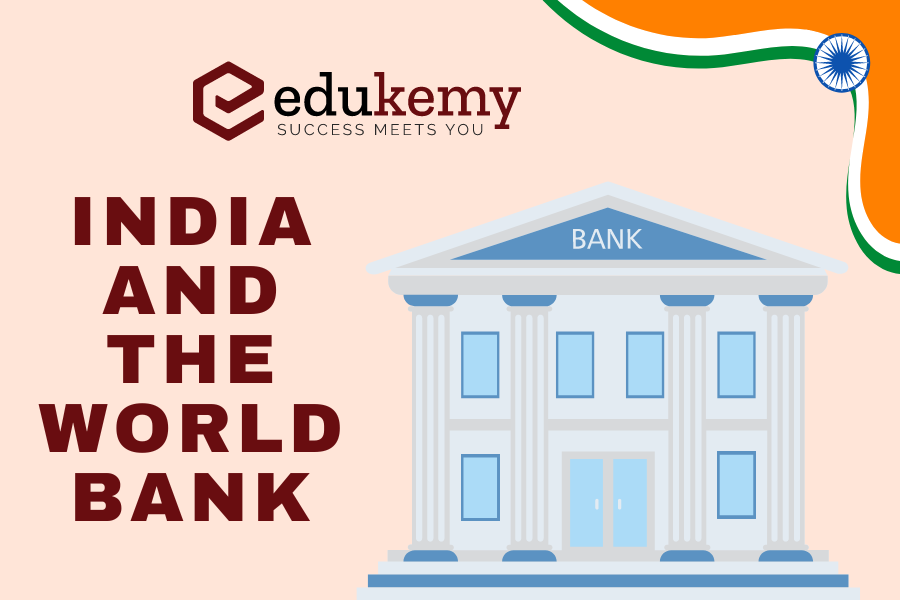
Founding Member and Beneficiary: India holds the status of being a founding member of the World Bank (WB), having played a pivotal role in its establishment. The relationship between India and the WB has been symbiotic, with India reaping substantial benefits from the bank’s operations in various dimensions. These benefits include financial assistance, expert advice, and the valuable experience gained from cross-country initiatives.
Financial Support and Flagship Programs: The World Bank has been a significant contributor to various flagship programs implemented by both the Government of India (GOI) and state governments. A considerable portion of the funding for initiatives related to poverty alleviation, infrastructure development, rural development, and human resource development has been provided by the WB.
Advantages of Borrowing from the World Bank: India strategically leverages the benefits of borrowing from the World Bank, particularly through the International Development Association (IDA), which offers concessional lending. The advantages include:
- Low Cost and Stable Financing:
- The World Bank provides financing at a low cost, contributing to stable and affordable funding for development projects.
- Longer Maturity Periods:
- Financing from the WB, especially through IDA, comes with longer maturity periods, allowing for extended repayment terms.
- Concessional Lending:
- IDA funds, being one of the most concessional external loans for the Government of India, are predominantly utilized in social sector projects aligning with the Sustainable Development Goals (SDGs).
- Multilateral Ownership:
- As a multilateral institution, the World Bank counts India among its owners. This aspect enhances India’s preference for sourcing financial support from the WB.
Cumulative Loans and State Involvement: The cumulative loans extended by the World Bank to India surpassed US$ 100 billion in 2019, reflecting the scale of financial support. However, the Indian Constitution prohibits direct borrowing by states from the WB. In adherence to this constitutional framework, the Government of India borrows from the WB and subsequently on-lends to the states. States actively participate in the consultation process, ensuring their involvement in the utilization of funds and project planning.
The enduring partnership between India and the World Bank continues to be a cornerstone in India’s development journey, addressing critical areas of socio-economic progress and contributing to the nation’s growth trajectory.
Contents
- 1 FAQs
- 1.1 Q: What is the relationship between India and the World Bank?
- 1.2 Q: How does India benefit from its association with the World Bank?
- 1.3 Q: What are some notable projects supported by the World Bank in India?
- 1.4 Q: How does India contribute to the World Bank?
- 1.5 Q: What is the current status of India’s engagement with the World Bank?
- 2 In case you still have your doubts, contact us on 9811333901.
FAQs
Q: What is the relationship between India and the World Bank?
India has a significant relationship with the World Bank, which dates back to its independence in 1947. The World Bank has been a crucial partner in India’s development efforts, providing financial and technical assistance across various sectors such as infrastructure, agriculture, education, and healthcare.
Q: How does India benefit from its association with the World Bank?
India benefits from the World Bank through financial aid, technical expertise, and policy advice. The World Bank’s support has helped India implement various development projects, improve infrastructure, alleviate poverty, and strengthen institutions. Additionally, the World Bank’s global network facilitates knowledge sharing and best practices, aiding India in addressing its developmental challenges effectively.
Q: What are some notable projects supported by the World Bank in India?
The World Bank has funded numerous projects in India, ranging from rural development to urban infrastructure. Some notable projects include the National Rural Livelihoods Mission (NRLM) aimed at poverty reduction, the National Highway Development Program (NHDP) enhancing transportation infrastructure, and initiatives like Swachh Bharat Mission focusing on sanitation and hygiene.
Q: How does India contribute to the World Bank?
India not only receives assistance from the World Bank but also contributes to its funding and governance. As one of the largest shareholders in the World Bank, India plays an active role in shaping its policies and strategies. India’s contributions help finance projects in other developing countries and reinforce its position as a key player in global development efforts.
Q: What is the current status of India’s engagement with the World Bank?
India’s engagement with the World Bank remains robust, with ongoing collaboration on various fronts. As India continues its journey towards sustainable development and economic growth, the partnership with the World Bank remains vital. Efforts are underway to align priorities with the Sustainable Development Goals (SDGs) and address emerging challenges such as climate change and digital transformation through innovative projects and initiatives supported by the World Bank.
In case you still have your doubts, contact us on 9811333901.
For UPSC Prelims Resources, Click here
For Daily Updates and Study Material:
Join our Telegram Channel – Edukemy for IAS
- 1. Learn through Videos – here
- 2. Be Exam Ready by Practicing Daily MCQs – here
- 3. Daily Newsletter – Get all your Current Affairs Covered – here
- 4. Mains Answer Writing Practice – here

